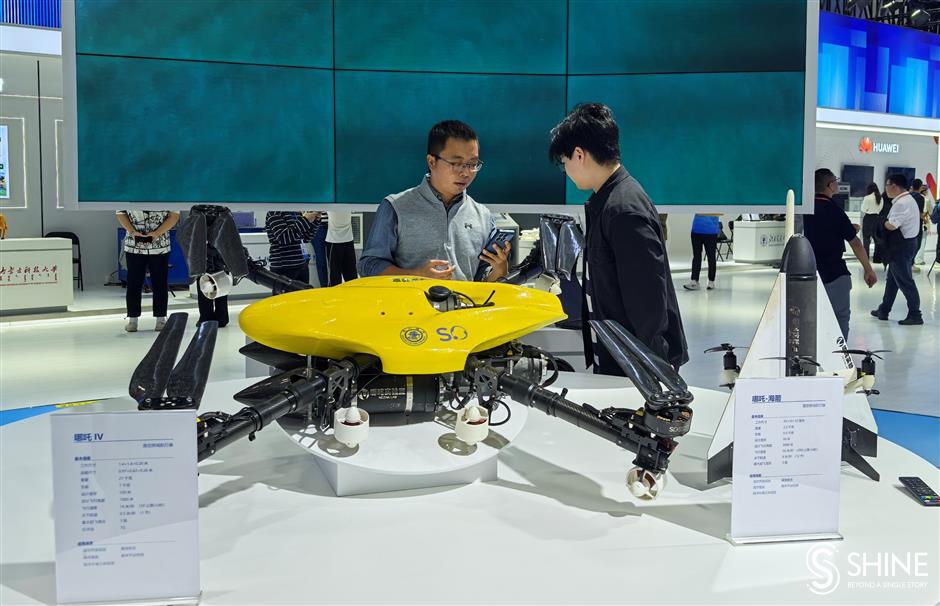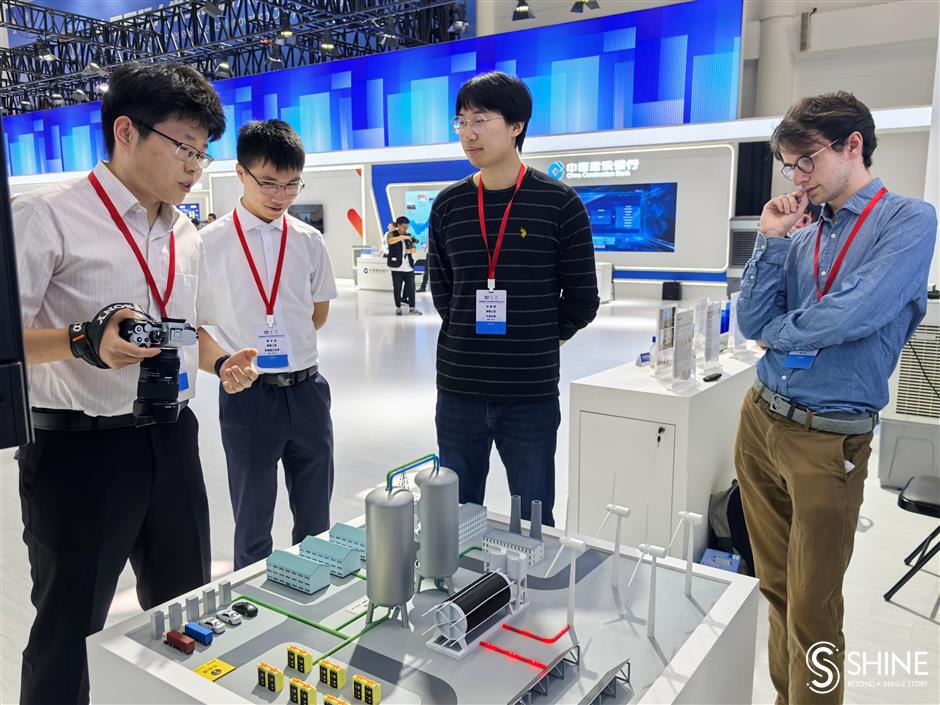Government News
Shanghai Jiao Tong team wins international student innovation competition 2024-10-29
Shanghai Jiao Tong University secured first prize at the 2024 China International College Students' Innovation Competition for developing a sea and air cross-domain unmanned vehicle.
The event was jointly organized by 12 departments including the Ministry of Education, in collaboration with the Shanghai government. With the theme, "Dare to Differ, Dare to Win," the competition attracted 5.14 million projects and 20.83 million participants from 5,406 universities across 153 countries and regions since its launch in May. Six teams of aspiring student innovators from among the world's top universities made it to the final held recently on the Minhang Campus of Shanghai Jiao Tong University.
Ultimately, a series of products titled "Nezha" – hybrid aerial and underwater vehicles – from Shanghai Jiao Tong University won the championship.
Nezha is a mythological figure from the famous Chinese novel "The Investiture of the Gods," also known as "Fengshen Yanyi" or "Fengshen Bang" in Chinese. He is often shown flying in the sky riding on the Wind-Fire Wheels and well-known for defeating the Dragon King, the God of Rain in Chinese mythology.

A team from Shanghai Jiao Tong University wins the championship at the 2024 China International College Students' Innovation Competition with their project – "Nezha."
The Shanghai Jiao Tong University team invented a series of vehicles that can fly in the sky and dive into the sea automatically, capable of missions such as observation of both marine and air environmental factors, underwater target detection and identification, and maritime emergency search and rescue.
The project "Virtual Computing Center: Grid-style Computing Power Scheduling Network" from Tsinghua University secured second place. The third place went to four projects: "BOUNDLESS: People's Livelihood Security Connectivity System" from the Xi'an University of Electronic Science and Technology; "Xishu Technology: Cross-season Zero Carbon Solar Heat Storage" from the China University of Geosciences (Beijing); "Vastech Energy: Next-generation Intrinsically Safe, High-power Energy Storage System" from the University College London; and " MagOss: Customized Biodegradable Magnesium-Based Bone Implants" from the University of New South Wales.

Alexander Harrison (right), a researcher from Oxford University, and his Chinese teammate Hong Haoliang (second right) show a model of their project to students from other universities.
The organizers said the competition emphasized integrated development by closely linking university innovation education with solving real-world industry problems, thus building a bridge between the education and industrial sectors. There was a special track for university students to solve industrial propositions. More than 2,000 enterprises submitted just over 4,500 propositions, with 1,073 universities, 74,000 projects and 311,000 participants registering.
It also turned out to be a platform to enhance cooperation and exchanges between Chinese college students and their peers from all over the world.
Alexander Harrison, a researcher from Oxford University, and his Chinese teammate Hong Haoliang brought a project on solid hydrogen storage to achieve a low-carbon energy grid.
"It's been a very interesting week, seeing all the projects and looking at all the different collaborations between universities," he said. "And I'm sure it will be very interesting to continue to work with the Shanghai Jiao Tong University on developing these materials and our reaction ideas."

Lohmann Moritz Nicolaus, a German student at Nanjing University, shows a transformative robot to visitors to his team booth.
Lohmann Moritz Nicolaus, a German student at Nanjing University, and his partners from Tianjin University and Technische Universität Berlin presented their project of affordable intelligent servo motor and metamorphic robots that can transform into the shapes of a dog, a spider, or even a snake.
Nicolaus said he was deeply impressed by China's supportive policies and systems that could efficiently facilitate innovators to start up their businesses.
"Efficiency is critical for entrepreneurs because if it takes too long a time to get the approval for starting a business, your competitors might have surpassed you," he said.
"So I think the environment here is more friendly for new entrepreneurs. I also found there are more opportunities for young people. I even saw there was a special section for high school students."
Source: Shanghai Daily
Application Status
| 04-16 | 21315227 | Processing |
| 03-12 | 21315226 | Processing |
| 09-26 | 21315225 | Processing |
Inquiry Status
| 02-29 | 02131558 | Received |
| 03-06 | 02131557 | Received |
| 11-14 | 02131556 | Received |
FAQ
Q: Q: Is there a place where I can get...
A: A: Log on to http://touch.shio.gov....
A: A: Log on to http://touch.shio.gov....
Q: Q: What is the easiest way to set u...
A: A: 1. Log on to http://touch.shio.g...
A: A: 1. Log on to http://touch.shio.g...
Q: Where can I get an English map of S...
A: English maps of Shanghai are availa...
A: English maps of Shanghai are availa...

